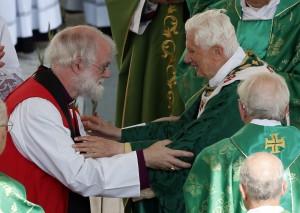Bischofssynode, 3. Tag (Mittwoch), früher Abend

Erzbischof Rowan Williams Ansprache bei der Bischofssynode am Mittwoch war sicherlich einer der Höhepunkte des Tages, wenn nicht sogar der Woche. Ein hervorragender Theologe und Rhetor ist es immer ein Gewinn ihn zu hören. Als Erzbischof von Canterbury vertritt er eine der Bruderkirchen, wie die Synode es nennt. Er sprach über die Kontemplation als uns verwandelnde Gegenwart Christi, die zu jeder Verkündigung dazu gehört. Ein Auszug:
St Paul speaks (in 2 Cor 3:18) of how ‘with our unveiled faces reflecting the glory of the Lord’, we are transfigured with a greater and greater radiance. That is the face we seek to show to our fellow‑human beings.
And we seek this not because we are in search of some private ‘religious experience’ that will make us feel secure or holy. We seek it because in this self‑forgetting gazing towards the light of God in Christ we learn how to look at one another and at the whole of God’s creation.
Die ultimative Antwort auf den Wahnsinn der Welt
In this perspective, contemplation is very far from being just one kind of thing that Christians do: it is the key to prayer, liturgy, art and ethics, the key to the essence of a renewed humanity that is capable of seeing the world and other subjects in the world with freedom ‑ freedom from self‑oriented, acquisitive habits and the distorted understanding that comes from them. To put it boldly, contemplation is the only ultimate answer to the unreal and insane world that our financial systems and our advertising culture and our chaotic and unexamined emotions encourage us to inhabit.
To learn contemplative practice is to learn what we need so as to live truthfully and honestly and lovingly. It is a deeply revolutionary matter.
Gegen das Verlangen nach Drama, Aufregung, Selbstbestätigung
In his autobiography Thomas Merton describes an experience not long after he had entered the monastery where he was to spend the rest of his life (Elected Silence, p.303). He had contracted flu, and was confined to the infirmary for a few days, and, he says, he felt a ‘secret joy’ at the opportunity this gave him for prayer ‑ and ‘to do everything that I want to do, without having to run all over the place answering bells.’ He is forced to recognise that this attitude reveals that ‘All my bad habits¼had sneaked into the monastery with me and had received the religious vesture along with me: spiritual gluttony, spiritual sensuality, spiritual pride.’ In other words, he is trying to live the Christian life with the emotional equipment of someone still deeply wedded to the search for individual satisfaction. It is a powerful warning: we have to be every careful in our evangelisation not simply to persuade people to apply to God and the life of the spirit all the longings for drama, excitement and self‑congratulation that we so often indulge in our daily lives.
Gott sein Gott sein erlauben
Contemplation is an intrinsic element in this transforming process. To learn to look to God without regard to my own instant satisfaction, to learn to scrutinise and to relativise the cravings and fantasies that arise in me ‑ this is to allow God to be God, and thus to allow the prayer of Christ, God’s own relation to God, to come alive in me.

